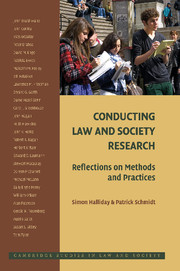Book contents
- Frontmatter
- Contents
- List of Contributors
- Acknowledgments
- 1 Introduction: Beyond Methods – Law and Society in Action
- 2 Stewart Macaulay and “Non-Contractual Relations in Business”
- 3 Robert Kagan and Regulatory Justice
- 4 Malcolm Feeley and The Process Is the Punishment
- 5 Lawrence Friedman and The Roots of Justice
- 6 John Heinz and Edward Laumann and Chicago Lawyers
- 7 Alan Paterson and The Law Lords
- 8 David Engel and “The Oven Bird's Song”
- 9 Keith Hawkins and Environment and Enforcement
- 10 Carol Greenhouse and Praying for Justice
- 11 John Conley and William O'Barr and Rules versus Relationships
- 12 Sally Engle Merry and Getting Justice and Getting Even
- 13 Tom Tyler and Why People Obey the Law
- 14 Doreen McBarnet and “Whiter than White Collar Crime”
- 15 Gerald Rosenberg and The Hollow Hope
- 16 Michael McCann and Rights at Work
- 17 Austin Sarat and William Felstiner and Divorce Lawyers and Their Clients
- 18 Yves Dezalay and Bryant Garth and Dealing in Virtue
- 19 Patricia Ewick and Susan Silbey and The Common Place of Law
- 20 Hazel Genn and Paths to Justice
- 21 John Braithwaite and Peter Drahos and Global Business Regulation
- 22 John Hagan and Justice in the Balkans
- 23 Conclusion: “Research Is a Messy Business” – An Archeology of the Craft of Sociolegal Research
- Index
- Cambridge Studies in Social and Cultural Anthropology
12 - Sally Engle Merry and Getting Justice and Getting Even
Published online by Cambridge University Press: 09 February 2010
- Frontmatter
- Contents
- List of Contributors
- Acknowledgments
- 1 Introduction: Beyond Methods – Law and Society in Action
- 2 Stewart Macaulay and “Non-Contractual Relations in Business”
- 3 Robert Kagan and Regulatory Justice
- 4 Malcolm Feeley and The Process Is the Punishment
- 5 Lawrence Friedman and The Roots of Justice
- 6 John Heinz and Edward Laumann and Chicago Lawyers
- 7 Alan Paterson and The Law Lords
- 8 David Engel and “The Oven Bird's Song”
- 9 Keith Hawkins and Environment and Enforcement
- 10 Carol Greenhouse and Praying for Justice
- 11 John Conley and William O'Barr and Rules versus Relationships
- 12 Sally Engle Merry and Getting Justice and Getting Even
- 13 Tom Tyler and Why People Obey the Law
- 14 Doreen McBarnet and “Whiter than White Collar Crime”
- 15 Gerald Rosenberg and The Hollow Hope
- 16 Michael McCann and Rights at Work
- 17 Austin Sarat and William Felstiner and Divorce Lawyers and Their Clients
- 18 Yves Dezalay and Bryant Garth and Dealing in Virtue
- 19 Patricia Ewick and Susan Silbey and The Common Place of Law
- 20 Hazel Genn and Paths to Justice
- 21 John Braithwaite and Peter Drahos and Global Business Regulation
- 22 John Hagan and Justice in the Balkans
- 23 Conclusion: “Research Is a Messy Business” – An Archeology of the Craft of Sociolegal Research
- Index
- Cambridge Studies in Social and Cultural Anthropology
Summary
Our understanding of the role of law in society has been shaped powerfully by research from exotic locales or unfamiliar cultures. The classic anthropological studies of conflict and disputing, in particular, looked to the Tobrianders of Papua New Guinea, the Tiv of northern Nigeria, and the Barotse of Zimbabwe. In the past few decades, however, Law and Society scholars have focused on notionally “familiar” settings closer to home, such as David Engel's journeys to Sander County (Chapter 8), Carol Greenhouse's study of Hopewell, Georgia (Chapter 10), and Patricia Ewick and Susan Silbey's examination of four New Jersey counties (Chapter 19). How well does the past generation's methodological and analytical toolbox travel? The importance of that question stretches well beyond the work of anthropologists, but to all researchers seeking out new settings in which to test and develop theory.
For Getting Justice and Getting Even, Sally Merry drove to the urban communities of Massachusetts, but the journey only began there. Intellectually, her working hypotheses utterly failed to explain what she was finding on the ground. Methodologically, a large urban setting challenged the received approach to ethnography. Yet, a tension between a received framework and a new situation is an invitation to creativity. In this interview, Merry reflects on the conceptual and methodological puzzles she confronted, her resolution of which advanced our understanding of the power of legal consciousness. In her prior research she had found that youths in a low-income housing project, many involved in crime, were going to court to fight one another. At a time when alternative dispute resolution (ADR) was expanding, she was primed to think about the uses of law in American cities.
- Type
- Chapter
- Information
- Conducting Law and Society ResearchReflections on Methods and Practices, pp. 129 - 140Publisher: Cambridge University PressPrint publication year: 2009



